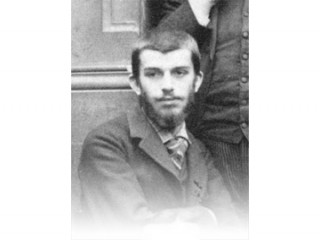
Elie Halevy biography
Date of birth : 1870-09-06
Date of death : 1937-08-21
Birthplace : Étretat, Seine-Maritime
Nationality : French
Category : Historian personalities
Last modified : 2011-03-17
Credited as : Philosopher, and historian, The Era of Tyrannies:Essays on Socialism and War
The French philosopher and historian Élie Halévywrote studies of the British utilitarians and a history of 19th-century England.
Elie Halévy was born on Sept. 6, 1870, at étretat, where his mother had fled as the German army marched on Paris. His father was the playwright Ludovic Halévy, and Élie grew up surrounded by musicians, scholars, and politicians. After studying at the école Normale, he received his doctorate in philosophy in 1901 with the theses The Platonic Theory of Knowledge and The Origins of Philosophical Radicalism. The latter formed the base of his first major study, The Formation of English Philosophical Radicalism (3 vols., 1901-1904).
In an article of 1893 Halévy suggested that the great moral question of modern thought was how the abstract idea of duty could become a concrete aim of society. This question had first attracted him to the utilitarians, and he found at the core of their answer a fundamental contradiction. Utilitarianism, he said, was based on two principles:first, that the science of the legislator must bring together the naturally divergent interests of individuals in society; and, second, that social order comes about spontaneously through the harmony of individual interests. To Halévy this exemplified two fundamental human attitudes toward the universe:the contemplation of the astronomer and the intervention of the engineer.
In 1892 Émile Boutmy invited Halévy to lecture on English political ideas at the newly founded School of Political Science. After 1900 he alternated this course with another, on the history of socialism. At the same time he helped found the Revue de métaphysique et de morale, in which he retained an interest until his death.
Halévy's teaching led him to undertake annual trips to England, during which he became the intimate friend of many of the most important scholars and political figures of the age. He thoroughly explored the Jeremy Bentham manuscripts at Cambridge for his work on philosophical radicalism and over the years developed a deep and intensive knowledge of all the sources of 19th-century English history. In 1901 he began to work on the first volume of his masterpiece, the History of the English People in the Nineteenth Century (1912). In this book he described England in 1815 and sought to explain how England avoided violent social change. "If economic facts explain the course taken by the human race, " he wrote, "the England of the nineteenth century was surely, above all other countries, destined to revolution, both politically and religiously." Neither the British constitution nor the Established Church was strong enough to hold the country together. He found the answer in religious nonconformity:"Methodism was the antidote to Jacobinism."
The second and third volumes of this history (1923) carried the story up to 1841. Then Halévy, profoundly moved by World War I, turned his attention to the period form 1895 to 1914. The tow volumes on this period (1926-1930) were written with considerable detachment, considering the immediacy of the problems he discussed.
In lectures of 1929, revised in 1936 (published in 1938; The Era of Tyrannies), Halévy argued that the world war had increased national control over individual activities and opened the way for de facto socialism. In opposition to those who saw socialism as the last step in the French Revolution, he saw it as a new organization of constraint replacing those that the Revolution had destroyed. A liberal individualist to the last, Halévy died at Sucy-en-Brie on Aug. 21, 1937.
Halévy's The Era of Tyrannies:Essays on Socialism and War (1938; trans. 1965) has a useful biographical and critical introduction, a preface, and a "Note" by different historians. There is a chapter on Halévy in Bernadotte E. Schmitt, ed., Some Historians of Modern Europe:Essays in Historiography (1942). An essay on Halévy appears in Herman Ausubel and others, eds., Some Modern Historians of Britain:Essays in Honor of R. L. Schuyler (1951).
















